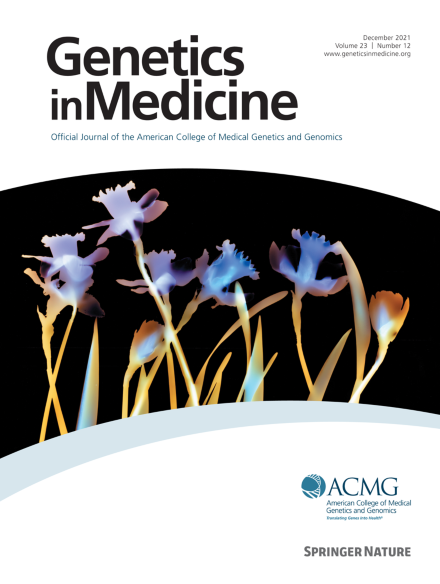Psychological and emotional impacts of communicating breast cancer risk using multifactorial assessment with polygenic risk score: Findings from PERSPECTIVE I&I
IF 6.2
1区 医学
Q1 GENETICS & HEREDITY
引用次数: 0
Abstract
Purpose
To examine the psychological and emotional outcomes of personalized breast cancer risk communication up to 1 year after disclosure in a risk-stratified breast screening preimplementation study (Personalized Risk Assessment for Prevention and Early Detection of Breast Cancer: Integration and Implementation).
Methods
Among 3753 females aged 40 to 69, unaffected by breast cancer, with a prior mammogram, and who underwent multifactorial risk assessment to estimate their 10-year breast cancer risk, 2734 completed follow-up questionnaires up to 1 year after risk communication: 78.5% were at average risk, 16.5% at higher than average risk, and 5.0% at high risk. The impact of risk communication on breast cancer worry and psychological distress and factors associated with decisional regret were examined.
Results
Breast cancer worry and psychological distress scores remained low after risk communication and at 1 year follow-up. Up to 1 year after disclosure, small significant differences in breast cancer worry were observed between risk levels. Decisional regret was very low 1 year after risk communication. Lower levels of decisional regret were significantly associated with some factors, including higher satisfaction with the information received.
Conclusion
This study suggests that personalized breast cancer risk communication has low negative psychological and emotional effects and highlights the importance of the information received for implementing this approach at population level.
使用多基因风险评分的多因素评估交流乳腺癌风险的心理和情感影响:来自视角I&I的发现
目的:在一项风险分层乳腺筛查实施前研究中,检查在信息披露后长达一年的个性化乳腺癌风险沟通的心理和情感结果(观点I&I)。方法:在3753名年龄在40-69岁之间、未患乳腺癌且既往有乳房x光检查的女性中,接受多因素风险评估以估计其10年乳腺癌风险,2734名女性完成了随访问卷,随访至风险沟通后一年:78.5%为平均风险,16.5%为高于平均风险,5.0%为高风险。研究了风险沟通对乳腺癌担忧和心理困扰的影响以及与决策后悔相关的因素。结果:乳腺癌焦虑和心理困扰评分在风险沟通后和随访1年后仍保持较低水平。在信息披露一年后,人们对乳腺癌的担忧程度在不同的风险水平之间存在微小的显著差异。风险沟通后一年的决策后悔率非常低。较低水平的决策后悔与一些因素显著相关,包括对收到的信息的较高满意度。结论:本研究表明,个性化乳腺癌风险沟通具有较低的负面心理和情绪影响,并强调了在人群水平上实施该方法所获得的信息的重要性。
本文章由计算机程序翻译,如有差异,请以英文原文为准。
求助全文
约1分钟内获得全文
求助全文
来源期刊

Genetics in Medicine
医学-遗传学
CiteScore
15.20
自引率
6.80%
发文量
857
审稿时长
1.3 weeks
期刊介绍:
Genetics in Medicine (GIM) is the official journal of the American College of Medical Genetics and Genomics. The journal''s mission is to enhance the knowledge, understanding, and practice of medical genetics and genomics through publications in clinical and laboratory genetics and genomics, including ethical, legal, and social issues as well as public health.
GIM encourages research that combats racism, includes diverse populations and is written by authors from diverse and underrepresented backgrounds.
 求助内容:
求助内容: 应助结果提醒方式:
应助结果提醒方式:


